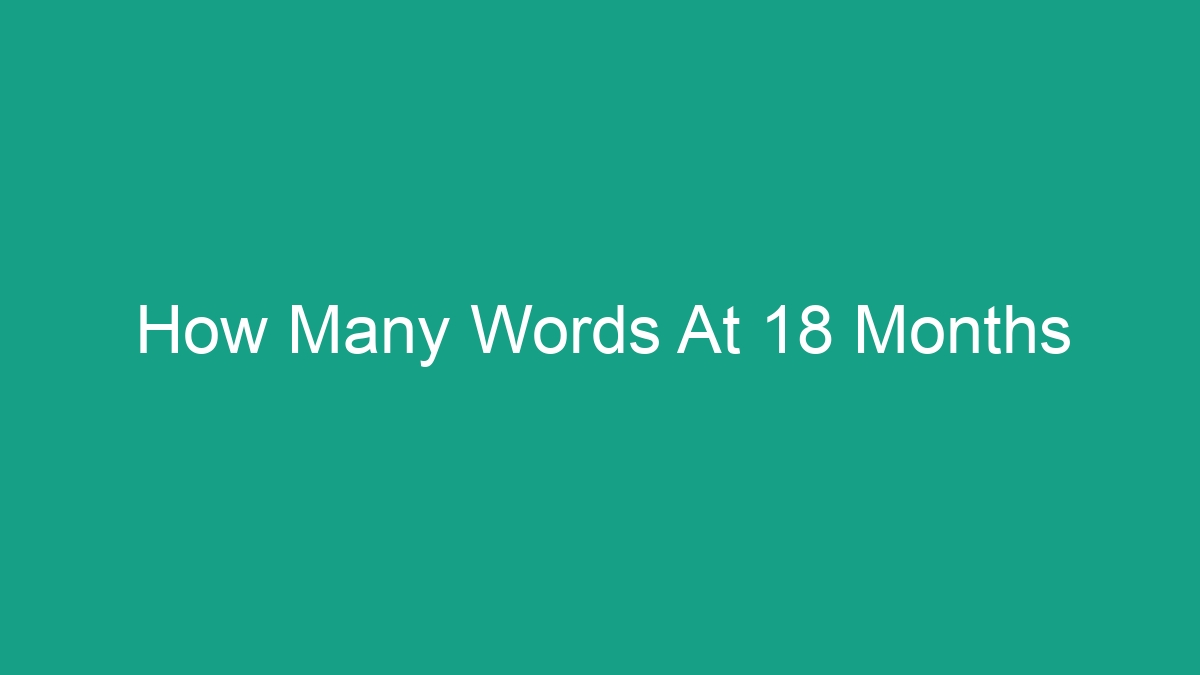
Are you wondering how many words your child should be saying at 18 months? Language development is an important milestone in a child’s growth, and it’s natural for parents to be concerned about their child’s progress. In this article, we’ll discuss the typical language development of an 18-month-old child and provide tips for encouraging their language skills.
Typical Language Development at 18 Months
At 18 months, most children are beginning to use words to communicate. They may only have a few words in their vocabulary, but they are starting to understand and use language to express their needs and wants. Here are some typical language development milestones for an 18-month-old child:
- 20 to 50 Words: By 18 months, a child typically has a vocabulary of 20 to 50 words. These words may include simple nouns, verbs, and adjectives such as “mama,” “dada,” “dog,” “eat,” and “up.”
- Two-Word Phrases: In addition to single words, a child may also start putting two words together to form simple phrases, such as “more milk,” “big dog,” or “daddy go.”
- Imitating Sounds: Children at this age are also starting to imitate the sounds of familiar animals, objects, and actions. They may make sounds like “moo” for a cow, “vroom vroom” for a car, or “whoosh” for a plane.
Understanding Language Development Variations
It’s important to note that every child is unique, and there is a wide variation in language development among 18-month-olds. Some children may have a larger vocabulary and be using more complex sentences, while others may be slower to start speaking. Here are some factors that can influence language development variations:
- Gender: Studies have shown that girls tend to develop language skills earlier than boys. However, this is not true for all children, and individual differences play a significant role in language development.
- Environment: The language exposure and interaction a child receives at home and in their environment can significantly impact their language development. Children who are exposed to a rich language environment tend to develop vocabulary and language skills more quickly.
- Genetics: Some children may have a genetic predisposition to language development delays or disorders. It’s essential for parents to be aware of any family history of language or speech difficulties and seek professional guidance if necessary.
Encouraging Language Development at 18 Months
As a parent, there are several ways you can encourage your 18-month-old child’s language development. Here are some tips to help support your child’s language skills:
- Talk to Your Child: Engage in conversations with your child throughout the day. Talk about what you are doing, ask questions, and encourage your child to respond, even if it’s just with gestures or sounds.
- Read Together: Reading to your child is one of the best ways to expose them to new words and language patterns. Choose age-appropriate books with colorful pictures and simple stories to capture their interest.
- Sing Songs and Rhymes: Music and rhymes are great for language development. Singing familiar songs and reciting nursery rhymes can help your child learn new words and improve their memory and language skills.
- Expand Their Vocabulary: Introduce new words to your child by labeling objects and actions in their environment. For example, point to a cat and say “Look, that’s a cat!” This helps your child make connections between words and their meanings.
- Limit Screen Time: Excessive screen time, such as watching TV or playing with electronic devices, can limit a child’s opportunities for language interaction and learning. Limit screen time and encourage real-life interactions instead.
When to Seek Professional Help
If you are concerned about your child’s language development at 18 months, it’s essential to seek professional guidance. Here are some signs that may indicate a need for professional evaluation:
- Very Few Words: If your child has very few words in their vocabulary or isn’t attempting to communicate using gestures or sounds, it may be a cause for concern.
- No Progress: If you don’t see any progress in your child’s language development over time, it’s essential to seek professional help to rule out any underlying issues.
- Difficulty Understanding: If your child has trouble understanding simple instructions or responding to your attempts at communication, it may be a sign of language comprehension difficulties.
If you notice any of these signs, it’s important to consult with your child’s pediatrician or a speech-language pathologist for an evaluation and guidance on the next steps.
FAQs
How can I help my 18-month-old talk?
You can help your 18-month-old talk by talking to them throughout the day, reading together, singing songs and rhymes, expanding their vocabulary, and limiting screen time to encourage real-life interactions.
Should I be worried if my 18-month-old isn’t talking?
While every child develops at their own pace, if your 18-month-old has very few words in their vocabulary or doesn’t attempt to communicate, it’s important to seek professional guidance to rule out any underlying issues.
What can I do if I’m concerned about my child’s language development?
If you’re concerned about your child’s language development, consult with your child’s pediatrician or a speech-language pathologist for an evaluation and guidance on the next steps.



